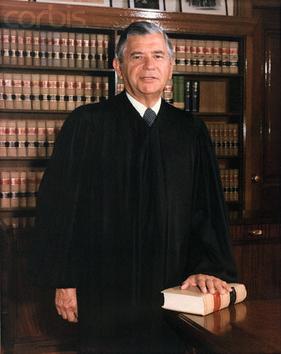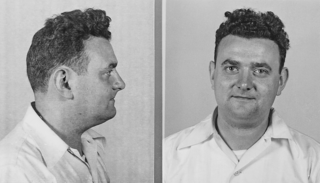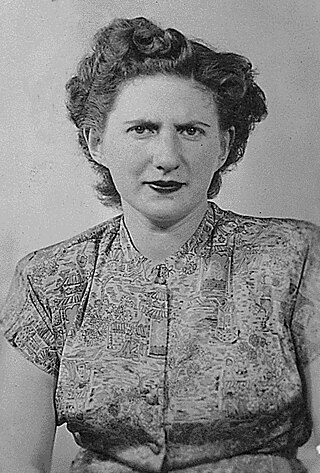Related Research Articles

Julius Rosenberg and Ethel Rosenberg were a Jewish married couple who were convicted of spying for the Soviet Union, including providing top-secret information about American radar, sonar, jet propulsion engines, and nuclear weapon designs. Convicted of espionage in 1951, they were executed by the federal government of the United States in 1953 at Sing Sing Correctional Facility in Ossining, New York, becoming the first American civilians to be executed for such charges and the first to be executed during peacetime. Other convicted co-conspirators were sentenced to prison, including Ethel's brother, David Greenglass, Harry Gold, and Morton Sobell. Klaus Fuchs, a German scientist working in Los Alamos, was convicted in the United Kingdom.

The Jewish Council for Public Affairs (JCPA) is an American Jewish nonprofit organization that advocates for progressive and liberal policies. Founded in 1944 as the umbrella organization for local Jewish advocacy arms known as community relations councils, for almost 80 years it represented approximately 125 local Jewish federations and community relations councils and was the coordinating body for 15 national Jewish organizations.
Ronald Radosh is an American Social Conservative writer, professor, historian, and former Marxist.
The American Jewish Committee (AJC) is a Jewish advocacy group established on November 11, 1906. It is one of the oldest Jewish advocacy organizations and, according to The New York Times, is "widely regarded as the dean of American Jewish organizations". As of 2009, AJC envisions itself as the "Global Center for Jewish and Israel Advocacy".

Irving Robert Kaufman was a United States circuit judge of the United States Court of Appeals for the Second Circuit and a United States district judge of the United States District Court for the Southern District of New York.

David Greenglass was an American machinist and atomic spy for the Soviet Union who worked on the Manhattan Project. He was briefly stationed at the Clinton Engineer Works uranium enrichment facility at Oak Ridge, Tennessee, and then worked at the Los Alamos Laboratory in New Mexico from August 1944 until February 1946.

Michael Meeropol is an American retired professor of economics. He is the older son of Julius and Ethel Rosenberg, convicted communist spies. Born in New York City, as Michael Rosenberg, Meeropol spent his early childhood living in New York and attending local school there.

Ruth Leah Greenglass was an American citizen who acted as a spy for the Soviet Union along with her husband, David Greenglass.
William Perl (1920–1970), whose original name was William Mutterperl, was an American physicist and Soviet spy.

Max Elitcher (1918–2010) was a prosecution witness in the Julius and Ethel Rosenberg trial in 1951.

Morton Sobell was an American engineer and Soviet spy during and after World War II; he was charged as part of a conspiracy which included Julius Rosenberg and his wife, Ethel Rosenberg. Sobell worked on military and government contracts with General Electric and Reeves Instrument Corporation in the 1940s, including during World War II. Sobell was tried and convicted of espionage in 1951 and sentenced to 30 years in prison.

Atomic spies or atom spies were people in the United States, the United Kingdom, and Canada who are known to have illicitly given information about nuclear weapons production or design to the Soviet Union during World War II and the early Cold War. Exactly what was given, and whether everyone on the list gave it, are still matters of some scholarly dispute. In some cases, some of the arrested suspects or government witnesses had given strong testimonies or confessions which they recanted later or said were fabricated. Their work constitutes the most publicly well-known and well-documented case of nuclear espionage in the history of nuclear weapons. At the same time, numerous nuclear scientists wanted to share the information with the world scientific community, but this proposal was firmly quashed by the United States government. It is worth noting that many scientists who worked on the Manhattan Project were deeply conflicted about the ethical implications of their work, and some were actively opposed to the use of nuclear weapons.
Anthony Robert Julius is a British solicitor advocate known for being Diana, Princess of Wales' divorce lawyer and for representing Deborah Lipstadt. He is a partner at the law firm Mishcon de Reya.
The Jewish Labor Committee (JLC) is an American secular Jewish labor organization dedicated to promoting labor union interests in Jewish communities, and Jewish interests within unions. The organization is headquartered in New York City, with local/regional offices in Boston, New York City, Philadelphia, Chicago and Los Angeles, and volunteer-led affiliated groups in other U.S. communities. It was founded in 1934 in response to the rise of Nazism in Europe. Today, it works to maintain and strengthen the historically strong relationship between the American Jewish community and the trade union movement, and to promote what they see as the shared social justice agenda of both communities. The JLC was also active in Canada from 1936 until the 1970s.
Emanuel Hirsch Bloch was an American attorney known for defending clients associated with left-wing and Communist causes. He and Marshall Perlin defended Julius and Ethel Rosenberg.
Marshall Perlin was a civil-liberties lawyer, who along with Emanuel Hirsch Bloch, defended Julius and Ethel Rosenberg. He came to the trial after the sentencing, during the appeal process.

Irving Howard Saypol was a United States attorney for the Southern District of New York and a New York Supreme Court Justice. He directed several high-profile prosecutions of Communists, including the cases of Alger Hiss, William Remington, Abraham Brothman, and Julius and Ethel Rosenberg.
William A. Reuben was an American journalist and writer who focused on the Rosenberg and Hiss cases.

Miriam Ruth Moskowitz was an American schoolteacher who served two years in prison after being convicted for conspiracy as an atomic spy for the Soviet Union.
The National Rosenberg Defence Committee (NRDC) was a British civil liberties organization formed to defend Ethel and Julius Rosenberg and seek clemency for them.
References
- ↑ "Guide to the National Committee to Reopen the Rosenberg Case Records TAM.174". New York University . Retrieved March 31, 2023.
- 1 2 "Letters: The Haunted Wood". New York Times. January 4, 1999. Retrieved March 23, 2023.
- ↑ "Cast of Characters". New York Times . Retrieved March 31, 2023.
- ↑ ""Anti-Semitism" and the Rosenberg Case:The Latest Communist Propaganda Trap" . Retrieved March 31, 2023.
- ↑ "Julius and Ethel Rosenberg". My Jewish Learning. Retrieved May 1, 2023.
- ↑ Hevesi, Dennis (October 6, 2008). "Aaron Katz, Advocate for Rosenbergs, Dies at 92". The New York Times.